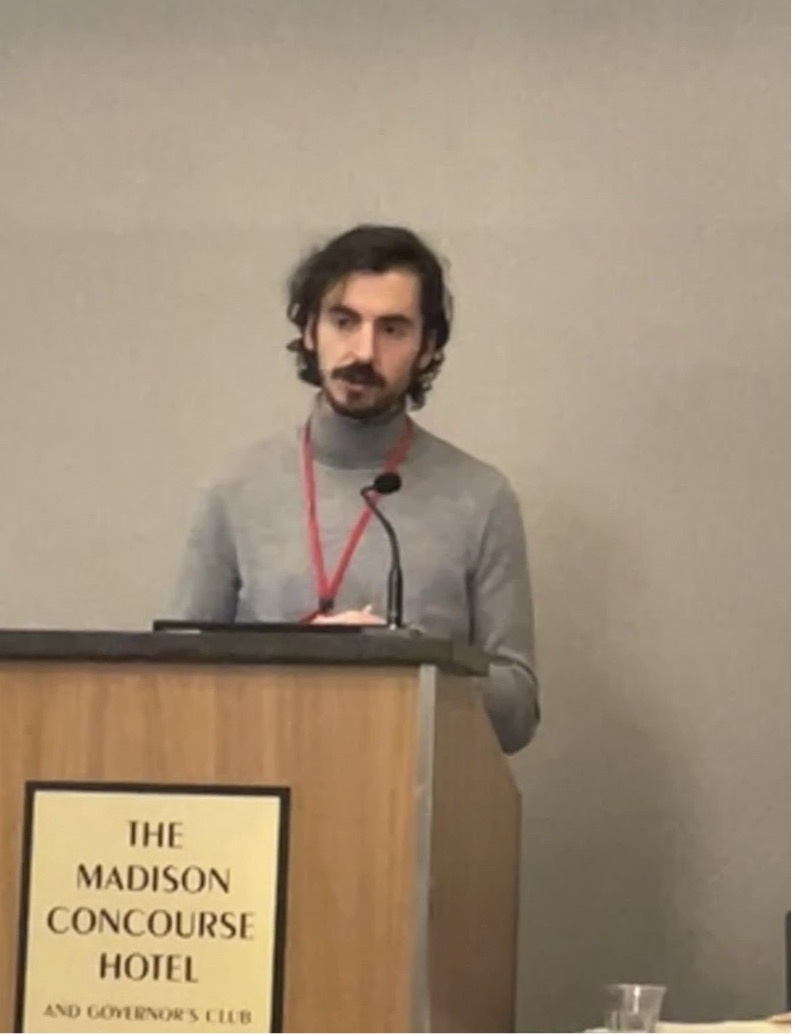Annual Conference on South Asia; University of Wisconsin
Kellogg Institute Conference Travel Grants
Conference: Annual Conference on South Asia; University of Wisconsin – Madison in Madison, Wisconsin
October 30 – November 2, 2024
Presentation: “Happiness and Punishment: Islamic Law, Robbery, and Prison Breaks in Early Colonial Delhi”
REPORT:
 At the Annual Conference on South Asia at UW-Madison, I delivered my paper, “Happiness and Punishment: Islamic Law, Robbery, and Prison Breaks in Early Colonial Delhi,” as part of a panel titled “Islamic Studies in South Asia.” My presentation explored how ideas about compassionate emotions and public happiness were debated in colonial legal practice in Delhi from 1811 to 1818. Through archival research based on the personal papers of Charles Metcalfe, the former Delhi Resident, and Muslim legal literature on discretionary punishment, I argued that the British colonial state, rather than simply formalizing or codifying the law, attempted to redirect the object of sympathy in Islamic law from the accused to the public to meet the security needs of empire. While Muslim judges privileged a legal concept of doubt and judicial empathy, the colonial state, drawing on Islamic discretionary law, attempted to circumvent this maxim by emphasizing public happiness and draconian penal reform. My findings show how the judiciary of the Delhi Residency debated and implemented legal reform at the level of emotion with implications for how we think about colonial management, legal history, and ideology in colonial India.
At the Annual Conference on South Asia at UW-Madison, I delivered my paper, “Happiness and Punishment: Islamic Law, Robbery, and Prison Breaks in Early Colonial Delhi,” as part of a panel titled “Islamic Studies in South Asia.” My presentation explored how ideas about compassionate emotions and public happiness were debated in colonial legal practice in Delhi from 1811 to 1818. Through archival research based on the personal papers of Charles Metcalfe, the former Delhi Resident, and Muslim legal literature on discretionary punishment, I argued that the British colonial state, rather than simply formalizing or codifying the law, attempted to redirect the object of sympathy in Islamic law from the accused to the public to meet the security needs of empire. While Muslim judges privileged a legal concept of doubt and judicial empathy, the colonial state, drawing on Islamic discretionary law, attempted to circumvent this maxim by emphasizing public happiness and draconian penal reform. My findings show how the judiciary of the Delhi Residency debated and implemented legal reform at the level of emotion with implications for how we think about colonial management, legal history, and ideology in colonial India.
The panel had a medium-sized audience, with several influential scholars in South Asian Islamic studies in attendance, offering valuable insights and feedback during the Q&A session. One particularly thoughtful commentor encouraged me to consider whether the concept of a ‘public’ was a colonial one or whether it had roots in Mughal India. Overall, this provided an excellent opportunity to engage with leading experts in the field and refine my ideas. In addition to the formal panel, I took full advantage of networking opportunities at lunches, dinners, and coffee breaks, engaging with both graduate students and established professors. These interactions were productive and fostered meaningful academic connections.
The UW-Madison conference is one of the most prestigious gatherings in the field of South Asian studies, drawing scholars from across the US, Europe, and India. The atmosphere was warm and collegial, which allowed for open discussions, and provided ample opportunities to build professional relationships with peers and senior scholars alike.
One notable development was my discussion with the editor of a respected scholarly journal, where we explored the possibility of publishing my paper. This conversation was a key highlight of the conference and could lead to significant professional advancement.






